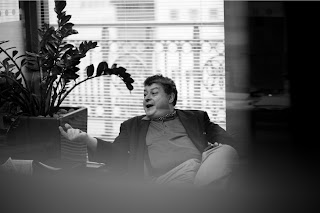 |
| image of rory pinched from his wiki man page |
"you’re more likely to get a job through someone you know vaguely than through your best friend. someone you’ve known for twenty years may be less likely to find you a job or give you references than people you’ve met five or six times. don’t forget there are a lot more of them."
i cheekily piped in with the fact that we only know each other vaguely; ogilvy here i come...
i have been particularly interested in herd mentalities since reading herd, nudge and the wisdom of crowds. rory elaborated on how difficult it is to quantify this way of being and how far we have come from the neo-classical economic model of human behaviour:
"we’re sort of a herd species in that we outsource a lot of our cognitive processes to other people. if we’ve got a choice of two cafés; one café’s empty and the other one’s heaving, even though it is more pleasant to go to the empty café we might have a certain anxiety about it because if it’s any good why is nobody there? what’s interesting and significant about this is not so much that we do it but that we do it unconsciously and therefore the effects of this kind of thing don’t evolve in the conventional market research."following a discussion about the contagion factor of the boris bikes (the fact that they are odd looking makes them stand out and you think that a lot of people are using them and "if lot of people are using them, shouldn't i be too??" there you have it; contagion,) rory offered up this other contagion gem:
"there’s a very known affect that around car dealerships you always get a pocket of sales of a particular brand of car and one of the reasons for that is that people simply see a lot of fords and are more likely to buy a ford. that’s simple contagion."
i feel that i have come away from the conversation with a stronger understanding of advertisers' uses of higher-order benefits, the factors that affect people's behaviour and decisions as well as what rory described as target moments (as opposed to target audiences).
our conversation ended with the following statement, which succinctly affirmed the reason why i am interested in behavioural economics:
"there are lots of factors in human decision making that affect our decision making without us being consciously aware of them and knowing what those might be at different times, in different people, at different places is a really really useful thing to do."i was really honoured to speak to someone with rory's expertise and humbled to find that no matter how high-up or busy a person you may be, giving time to impart your knowledge to help someone starting out is possible and hugely valuable. i will be sure to remember this as i climb the ranks.

